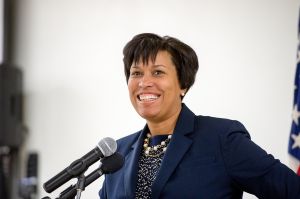
Source: The Washington Post / Getty
Mayor Bowser added those connected with the cases and incidents captured on the camera can have access to view. Not everyone is agreeing or believing that idea.
WASHINGTON — After this month’s police killing of Walter Scott in South Carolina, Americans were treated to another lesson in how police departments can spin such incidents. If not for a citizen’s cell phone footage, the public may never have known what really happened between Scott and Officer Michael Slager.
Officials in South Carolina and just about everywhere else are urging more body cameras for police officers to discourage such excessive force. The latest calls echo President Barack Obama’s sentiments in December when he announced the allocation of tens of millions in federal dollars to help pay for these cameras.
But in Washington, D.C., the mayor is attempting to gut the power of the body cameras.
D.C. Mayor Muriel Bowser wants to make footage captured by police body cameras exempt from public records laws. Bowser tucked this provision into a spending bill, according to the Washington City Paper.
“While the recordings could surface in court cases, they’d be otherwise out of reach for the reporters or the public — even in high-profile cases, like officer-involved shootings,” the paper reported.
“The goal is to respect privacy,” Bowser spokesman Michael Czin told the paper.
The mayor is following in others’ footsteps. Legislation that would limit the public’s access to police camera footage is either pending or has passed in Iowa, Kansas and other states, according to the Associated Press. The American Civil Liberties Union has raised privacy concernsabout such footage: Could the scene of a suicide or video of a domestic dispute be made public? Will good public policy lead to just another embarrassing moment uploaded to YouTube?
The debate over these issues should not be rushed, argues Michael Tobin, executive director of D.C.’s Office of Police Complaints. “The most important part is there’s a community conversation about the policies and procedures,” he told The Huffington Post.
Still, if Bowser’s bodycam measure becomes law, any future Walter Scott cases in D.C. may never come to light.
READ MORE: HuffingtonPost.com
Article Courtesy of The Huffington Post
Picture Courtesy of Getty Images















